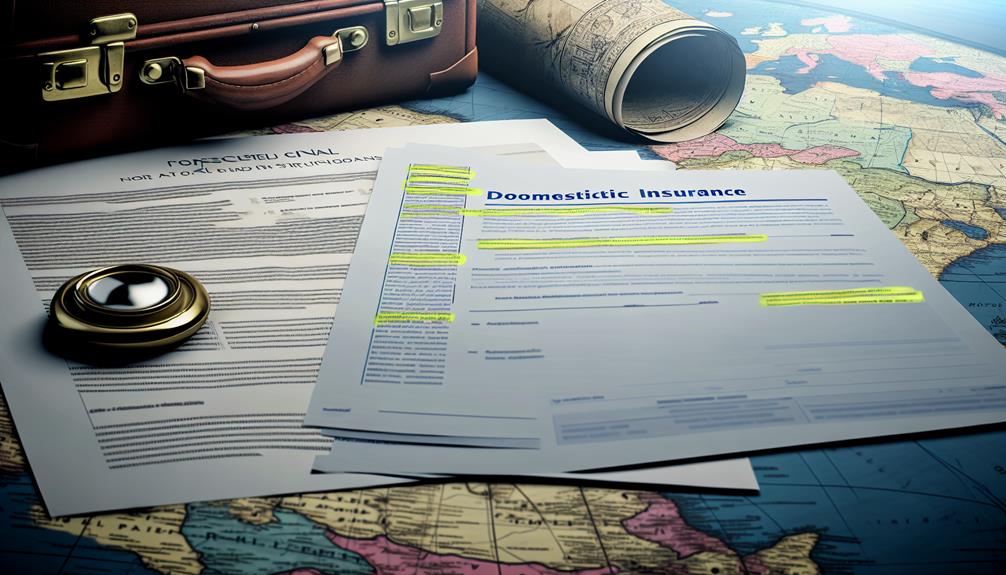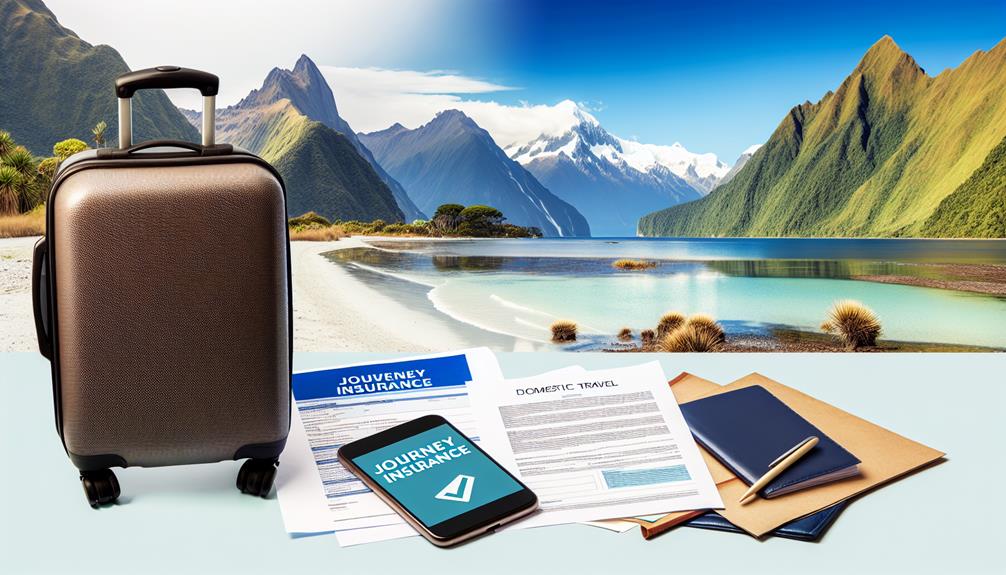Getting journey insurance for domestic travel is vital for your peace of mind. Start by researching different insurance providers and comparing coverage options that fit your needs, like trip cancellation or emergency medical coverage. Use online platforms for quick quotes, and purchase the policy as soon as your trip is booked to guarantee the best rates. Review the policy's exclusions and limits to avoid surprises later on. Keep documentation handy for claims. By taking these steps, you'll protect yourself from potential losses. There's more information available that can help you make informed decisions about your travel insurance needs.
Key Takeaways
- Research different travel insurance providers and compare their coverage options and customer reviews for the best fit.
- Utilize online comparison platforms like Squaremouth to obtain multiple quotes and find the most suitable policy.
- Purchase insurance as soon as any trip components are booked to maximize coverage benefits and secure lower premiums.
- Review policy terms carefully, paying attention to exclusions and coverage limits to ensure adequate protection for your trip.
- Keep a copy of your insurance policy and related documents for easy access during claims or emergencies.
Importance of Travel Insurance
Travel insurance is your safety net when planning a trip, safeguarding your investment against unexpected hiccups. The significance of travel insurance for domestic trips can't be overstated. It provides essential coverage for situations like trip cancellations, medical emergencies, and lost luggage, ensuring that you're financially protected. When you consider the average cost of travel insurance is around $237, it's a small price to pay compared to potential losses from non-refundable expenses.
Having thorough coverage means you won't have to stress about out-of-pocket costs when emergencies arise. This is especially important for travelers with pre-existing medical conditions, as policies often include emergency assistance for unforeseen health issues. With travel protection, you'll experience peace of mind knowing you're prepared for a variety of situations that could derail your plans.
Moreover, many travelers have faced costly medical emergencies or cancellations that were fully covered by their policies, highlighting the significant savings travel insurance can offer. By investing in travel insurance for domestic trips, you're not just protecting your finances; you're also ensuring a smoother and more enjoyable experience. Don't overlook this critical aspect of travel planning!
Types of Coverage Available
When planning your domestic trip, understanding the types of coverage available in travel insurance is essential. Knowing what's out there helps you choose the right policy for your needs. Here are three key types of coverage to evaluate:
- Trip Cancellation and Interruption: This covers reimbursement for nonrefundable expenses if you need to cancel or cut your trip short due to unforeseen events. It can save you a lot of money and stress.
- Emergency Medical Coverage: Accidents and illnesses can happen at any time. This coverage guarantees you have access to necessary medical care without incurring high out-of-pocket costs while traveling.
- Baggage Coverage and Personal Items Protection: Protects against lost, stolen, or damaged luggage and offers reimbursement for essential items if your baggage is delayed. It also covers valuable items, providing peace of mind during your travels.
Additionally, examine travel delay insurance, which reimburses extra expenses incurred from delays, guaranteeing you're covered for accommodations and meals. By understanding these options in domestic travel insurance, you can travel with confidence, knowing you're protected.
Cost Considerations

Understanding the costs associated with journey insurance can greatly impact your travel budget. The average travel insurance cost for U.S. trips typically ranges from 3% to 10% of your total trip costs. This means you could expect to pay around $237 for a standard policy, according to Squaremouth.
When shopping for insurance for your domestic travels, keep in mind that premiums can vary considerably based on factors like your age, trip duration, and the coverage limits you choose. Extensive coverage often results in higher premiums, so it's crucial to evaluate the coverage you need.
Look for discounts, especially if you're considering multi-trip policies or family plans, as these can lower your overall cost considerably. Adding additional travelers on the same policy usually incurs only a minimal increase in cost, making it a smart choice for families or groups.
Lastly, purchasing travel insurance early can help secure better rates and guarantee access to valuable benefits like pre-existing condition waivers and financial default coverage. By understanding these cost considerations, you can make informed decisions that protect your travel investment.
Steps to Purchase Insurance
Purchasing journey insurance can seem overwhelming, but breaking it down into manageable steps makes the process straightforward. Here's how to get started:
- Research: Begin by exploring various insurance providers. Compare coverage options, costs, and customer reviews to find the best fit for your needs. Look for policies that offer adequate medical coverage and consider the trip duration.
- Utilize Online Platforms: Use platforms like Squaremouth to obtain multiple quotes. These sites help you filter policies based on specific requirements such as pre-existing condition waivers and coverage for financial defaults.
- Make the Purchase: Once you've selected a policy, purchase travel insurance as soon as you book any part of your trip. This maximizes your benefits. Carefully review the terms and conditions of the policy, paying close attention to exclusions and coverage limits to avoid surprises. Complete the purchase by providing your personal information and payment details, and don't forget to keep a copy of your policy and confirmation for reference while traveling.
Understanding Policy Limitations

After you've successfully purchased your journey insurance, it's important to familiarize yourself with the policy limitations. Each policy comes with specific coverage limits that dictate how much you'll get for claims like trip cancellations or medical emergencies. Review these limits carefully; they can vary greatly between policies.
Be aware of exclusions that may affect your reimbursement. For instance, many plans don't cover pre-existing medical conditions, high-risk activities, or cancellations due to change of mind. Additionally, some unexpected expenses may only be covered if they arise from unforeseen circumstances, so planned events might not qualify for reimbursement.
You should also note any waiting periods that apply, particularly for trip delays or cancellations. This means you might need to wait a certain period before filing a claim.
Lastly, understanding the documentation requirements is essential. Proper paperwork is critical for a smooth claims process; failing to submit the required documentation can lead to claim denials. By grasping these policy limitations, you'll be better prepared to navigate any issues that arise during your travels.
Claims Process Explained
When you need to file a claim for your journey insurance, acting quickly is vital. The claims process can be straightforward if you follow these steps:
- Contact Your Insurance Provider: Reach out immediately to report the incident and learn about their specific requirements for claim submission.
- Gather Documentation: Collect all necessary documentation. This includes your insurance policy, detailed incident reports, receipts, and any other relevant evidence that supports your claim.
- Complete the Claims Form: Fill out the claims form provided by your insurance provider. Verify all information is accurate and aligns with the supporting documentation.
Submitting your claim promptly is important, as many travel insurance policies require claims to be filed within a specific time frame, often within 30 days of the incident. After submission, follow up with your insurance provider to check the status of your claim and confirm that all required documents are in processing. This proactive approach not only enhances your customer experience but also increases the likelihood of a successful claim.
Benefits of Early Purchase

Securing journey insurance early can greatly enhance your travel experience. By purchasing your travel insurance as soon as you book any part of your trip, you maximize coverage benefits. Early purchase provides financial default protection and trip cancellation coverage, ensuring you're safeguarded against unforeseen events.
Moreover, if you buy your policy within 15 days of your initial trip deposit, you may qualify for a pre-existing medical condition waiver, which is vital for those with existing health issues. Additionally, early buyers often gain access to "Cancel for Work Reasons" coverage, adding flexibility if work responsibilities interfere with your plans.
Here's a quick overview of the benefits:
| Benefit | Description | Importance |
|---|---|---|
| Trip Cancellation Coverage | Reimburse costs if you cancel for valid reasons | Financial security |
| Pre-existing Condition Waiver | Covers existing health issues | Peace of mind |
| Enhanced Benefits | Higher coverage limits for early purchasers | extensive protection |
Frequently Asked Questions
Should I Buy Travel Insurance for Domestic Travel?
You should consider buying travel insurance for domestic travel. It protects you against unforeseen events like trip cancellations or lost luggage, giving you peace of mind. The cost is typically only 3% to 6% of your trip's total price, which is a small price for financial security. Plus, if you purchase it soon after booking, you can maximize your benefits, including coverage for pre-existing conditions. It's a smart investment for any traveler.
Does Travel Insurance Cover Domestic?
Yes, travel insurance does cover domestic trips. It protects you from unexpected events like trip cancellations, medical emergencies, and lost luggage while traveling within the U.S. Most all-inclusive plans also cover travel delays and emergency medical expenses. The cost generally ranges from 3% to 10% of your total trip cost, so it's wise to compare quotes and check the specific terms of each policy to guarantee you're adequately covered.
Can I Buy Travel Insurance After Purchase?
Yes, you can buy travel insurance after you've made your travel arrangements. However, it's best to purchase it as soon as possible to guarantee you get the most extensive coverage. If you wait too long, you might miss out on benefits like the "Pre-Existing Condition Waiver." Also, keep in mind that buying late could lead to higher premiums and limited options, so be sure to review your policy carefully before committing.
Who Is the Best Company to Get Travel Insurance?
When you're looking for the best travel insurance company, consider your specific needs. AXA Travel Insurance offers extensive coverage, while Travel Guard provides customizable plans with 24/7 assistance. If you're planning adventurous trips, World Nomads may be your best bet. For families, Travelex Insurance Services covers kids under 17 at no extra cost. Finally, InsureMyTrip lets you compare options to find the perfect fit for your travels. Make your choice wisely!
